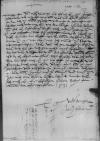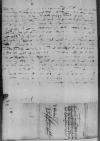Von Medina del Campo, town and castle in central Spain, Castile and León, 45 km SW of Valladolid⌊Med(in)a del CampoMedina del Campo, town and castle in central Spain, Castile and León, 45 km SW of Valladolid⌋ aus hab ich E(uer) G(naden) jungst cf. Hieronymus SAILER to Ioannes DANTISCUS Medina del Campo, 1530-12-29, CIDTC IDL 572⌊geschribencf. Hieronymus SAILER to Ioannes DANTISCUS Medina del Campo, 1530-12-29, CIDTC IDL 572⌋ / und anzaigt wie um(m) Isabel Delgada (†after 1546-06-15), Dantiscus' paramour during his stay in Spain, mother of his two children, Juana and Juan (Juan died in childhood)⌊weibIsabel Delgada (†after 1546-06-15), Dantiscus' paramour during his stay in Spain, mother of his two children, Juana and Juan (Juan died in childhood)⌋ und Juana Dantisca (*1527 – †1601), daughter of Ioannes Dantiscus and Isabel Delgada; wife of Diego Gracián de Alderete (SKOLIMOWSKA 2004, p. 52; LLAMAS 1995; LLAMAS 1999; LLAMAS 2001; LLAMAS, SKOLIMOWSKA; MELGAR, 37, ...)⌊kindJuana Dantisca (*1527 – †1601), daughter of Ioannes Dantiscus and Isabel Delgada; wife of Diego Gracián de Alderete (SKOLIMOWSKA 2004, p. 52; LLAMAS 1995; LLAMAS 1999; LLAMAS 2001; LLAMAS, SKOLIMOWSKA; MELGAR, 37, ...)⌋ gestelt ist / die ich zu Valladolid (Vallisoletum, Oleti vallis), city in central Spain, Castile and León, on the Pisuerga river⌊Vall(adoli)dValladolid (Vallisoletum, Oleti vallis), city in central Spain, Castile and León, on the Pisuerga river⌋ gesechen und mit ir gesprochen hab. Schicket auch mit ain br(ieff) von der s(e)nora Isabel Delgada (†after 1546-06-15), Dantiscus' paramour during his stay in Spain, mother of his two children, Juana and Juan (Juan died in childhood)⌊Yssabel DalgadaIsabel Delgada (†after 1546-06-15), Dantiscus' paramour during his stay in Spain, mother of his two children, Juana and Juan (Juan died in childhood)⌋. Nu(n) hab ich seyd kain brieff noch ander zeittong vo(n) E(uer) G(naden) gehapt / uns diss geschicht allain, d(a)z ich E(uer) G(naden) noch hiemit ain brieff von der s(e)nora schick / und damit E(uer) G(naden) nit sag(en) müg, ich meine(n) zu sagen nit gnug thie / wil wol ich gar nichs zu schr(eibe)n wais / dan hie ist doch gar nichs nuys v(er)handen / d(a)z dan das ma(n) v(er)hofft beim Charles V of Habsburg (*1500 – †1558), ruler of the Burgundian territories (1506-1555), King of Spain as Charles I (1516-1556), King of Naples and Sicily, King of the Romans (1519-1530), Holy Roman Emperor of the German Nation (elected 1519, crowned 1530, abdicated 1556); son of Philip I the Handsome and Joanna the Mad of Castile⌊m(aieste)tCharles V of Habsburg (*1500 – †1558), ruler of the Burgundian territories (1506-1555), King of Spain as Charles I (1516-1556), King of Naples and Sicily, King of the Romans (1519-1530), Holy Roman Emperor of the German Nation (elected 1519, crowned 1530, abdicated 1556); son of Philip I the Handsome and Joanna the Mad of Castile⌋ dis jar in Spain (Hispania)⌊Spania(m)Spain (Hispania)⌋ kome(n) w(er)d, d(a)z ich aber nit glaub. / Geg(en) herbst wil ich wider hin aus hoff, noch E(uer) G(naden) am hoff zu egreyffen / es v(er)nempt mich nach br(ieffe)n von E(uer) G(naden) / um(m) E(uer) G(naden) gesonthait und wolfart zu v(er)nem(en) / geliebe doch E(uer) G(naden) dem s(e)nor Cornelis De Schepper (Cornelius Scepperus, Cornelis De Dobbele, Cornelius Duplicius) (*1503 – †1555), erudite, diplomat in the Habsburgs' service; close friend of Ioannes Dantiscus; initially in the service of Christian II of Oldenburg, King of Denmark; 1526 secretary and councillor to Emperor Charles V of Habsburg (CE, vol. 3, p. 218-220; DE VOCHT 1961, p. 15-24)⌊CornellisCornelis De Schepper (Cornelius Scepperus, Cornelis De Dobbele, Cornelius Duplicius) (*1503 – †1555), erudite, diplomat in the Habsburgs' service; close friend of Ioannes Dantiscus; initially in the service of Christian II of Oldenburg, King of Denmark; 1526 secretary and councillor to Emperor Charles V of Habsburg (CE, vol. 3, p. 218-220; DE VOCHT 1961, p. 15-24)⌋ ain zu bring(en) und mir zon zeit(ung) auch ain br(ieff)lin lassen schr(eibe)n. / Damit wil ich mich E(uer) G(naden) befolhen haben. /


 BCz, 1595, p. 224
BCz, 1595, p. 224